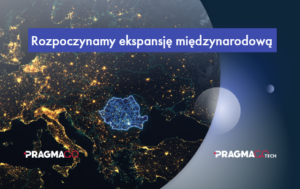PragmaGO is a leader in the SME sector financing market. In 2022, the Company exceeded a record turnover of 1.5 million zlotys. How did PragmaGO achieve this success? This is primarily the result of wise business decisions, acquisitions and investments, and the implementation of a strategy with support for micro, small and medium-sized entrepreneurs at its center.
1996: formation of Premium Financial Group
It all started 25 years ago – in 1996 in Katowice, where Premium Financial Group was founded. The company initially offered debt collection services and loans to small, medium, but also large companies (for example, in the mining sector). Customer acquisition and service was handled by a sales department of several people. Seeking customers was analog in those days, the phone book and telephone were used for this purpose. The company’s first computer didn’t appear until several years later, and not everyone had access to it.
The credit committee at the time was the Board of Directors, which made decisions for each customer.Around 2007, factoring was introduced– at that time an experimental product, virtually unknown among small and medium-sized entrepreneurs, and expensive (factoring costs hovered around 5-7% for 30 days of financing). Over time, the product became profitable and contributed to the company’s growth. After 11 years on the market (in 2007), Premium Financial Group debuted on the WSE, gaining tens of millions of zlotys in capital.
2002: establishment of Pragma Inkaso
In 2002, Pragma Inkaso was established in Tarnowskie Góry, a company founded by three colleagues, including the current CEO of PragmaGO – Tomasz Boduszek. Pragma Inkaso dealt mainly with B2B debt collection, over time becoming one of the most recognizable brands in the non-banking market. Only six years later, there was a need for recapitalization and the company debuted on NewConnect, and two years later, in 2010, on Catalyst and the main floor of the WSE. It was a watershed moment. The recapitalization provided new opportunities for growth. The time had come to expand the business, and one way to do this was to acquire another company. On behalf of the brokerage, Jacek Obrocki – a current member of PragmaGO’s Board of Directors – helped in the search for a suitable target.
2011: Pragma Faktoring is established – Pragma Inkaso acquires Premium Financial Group
Pragma Inkaso has been trying to develop new products for some time now, focusing primarily onfactoring. So the decision was made to acquire Premium Financial Group, which had the background and knowledge to quickly develop this service.Thecompany already had a factoring system and insurance in place, and the team had extensive sales experience. At the same time, Premium Financial Group had problems with over-liquidity at that point, caused by, among other things, the following. misguided investment decisions.
In 2011, an acquisition took place, leading to the creation of Pragma Factoring. The deal has stirred up a lot of excitement in the investment community. It is not often that the acquiring company is three times smaller in capital than the acquired company. The takeover went smoothly – as recalled by employees who work at PragmaGO to this day, the clash of two organizational cultures initially caused anxiety, but relatively quickly it was noticed thatthe new management is mainly focused on introducing solutions that are worked out together – based on the experience of both organizations.
New business model
Over time, factoring has become a product available to smaller entrepreneurs. They needed fast and efficient financing, for relatively small amounts (compared to corporations).There was a need to move away from large and time-consuming transactions with individual customers, in favor of volume, even if it meant a lower average turnover value of a single sale. In the new business model, the salesman no longer had the time capacity to take care of the customer at all stages of the transaction. We had to look for a new way to provide customers with quick access to financing.
2016: investment in LeaseLink and Mint Software
LeaseLink is a company that offers leasing services, available completely online. LeaseLink’s customers were entrepreneurs with low-volume financing needs. Pragma Factoring has invested in LeaseLink, which has inspiredchanges in the way factoring products are sold. Once again, there was a merger that allowed know-how and experience to flow between previously unrelated organizations. Largely as a result of its experience with LeaseLink, Pragma Faktoring has expanded its online sales channel, which has allowed it to reach more smaller customers.The online sales channel has received a new brand, namely “PragmaGO.”
However, successful online sales would not be possible without the right technological facilities to ensure the security and ease of use of the system. Having a close-knit and experienced team of developers inside the organization would ensure constant access to software. Thus, the technology companyMint Software (now PragmaGO.tech) joined the group. With this merger, Pragma Factoring has become a fintech company, and technological development is one of the bases for optimizing operations.
Repetitive tasks are to be performed by technology. The time freed up by technology is spent building relationships with customers and listening carefully – to hear what their needs are. Then we go back to the technology with this knowledge and design appropriate solutions. We scale them up and check them out – we listen again. This is how good products are made
– CEO Tomasz Boduszek reveals.
2020: Pragma Faktoring changes name to PragmaGO, investment in fintech Brutto.pl
The change of the company’s name became necessary because Pragma Factoring no longer offered only factoring. As the market and customer needs developed, new products were gradually introduced – including. Single invoice financing, tax financing or loans.The name “Pragma Factoring” was replaced by “PragmaGO.”
In 2020, there was also an investment in fintech startup Brutto.co.uk, which specializes in providing financial services to online accounting office clients. These are services in which PragmaGO’s management sees great potential for growth in the near future.
2021: Polish Enterprise Funds invest in the company, start cooperation with Allegro Business
In 2021, there was a partnership with Allegro Business. The partnership has given thousands of entrepreneursthe opportunity to finance their BNPL (“buy now, pay later”) purchases in the B2B market.
There was also another breakthrough moment – PragmaGO was acquired by thePolish Enterprise Funds.The Fund’s investment is an infusion not only of financial resources, but also ofconsulting facilities. Thus, this is another moment in the company’s development where expertise is transferred. This makes it possible to realize the objectives reflected in the company’s name.“GO” is about speed and constantly moving forward in response to changing customer needs.
2022: 1.5 million in turnover, acquisition of Fandla’s business and cooperation with EBRD
The year 2022 was very successful for the Company, which achieved a record turnover value of more than PLN 1.6 billion (up 58% year-on-year). In August, the European Bank for Reconstruction and Development granted PragmaGO a €5 million loan. Thus, the Company has joined the ranks of companies that can boast of undertaking cooperation with this esteemed institution. In September, PragmaGO made another acquisition – an organized part of Fandla Factoring, opening an office in Warsaw. A strategic investor (Enterprise Investors) has increased PragmaGO’s equity to PLN 100 million.
2022 is also the year of dynamic growth of embedded finance services in the partnership channel (under this model, the Company provided financing worth PLN 313 million, a year-on-year increase of 64%). PragmaGO’s new partners include. Teleroute, Drukomat, Cairo B2B, Waltoria, Hurton. Previous cooperation with Alleg ro has resulted in the further development of Allegro Pay Business and the introduction of an innovative product – Merchant Finance. In this service, PragmaGO provides a financing proposal for the platform’s merchants based on analysis of transaction and behavioral data provided by Allegro.
 15-01-2023
15-01-2023

